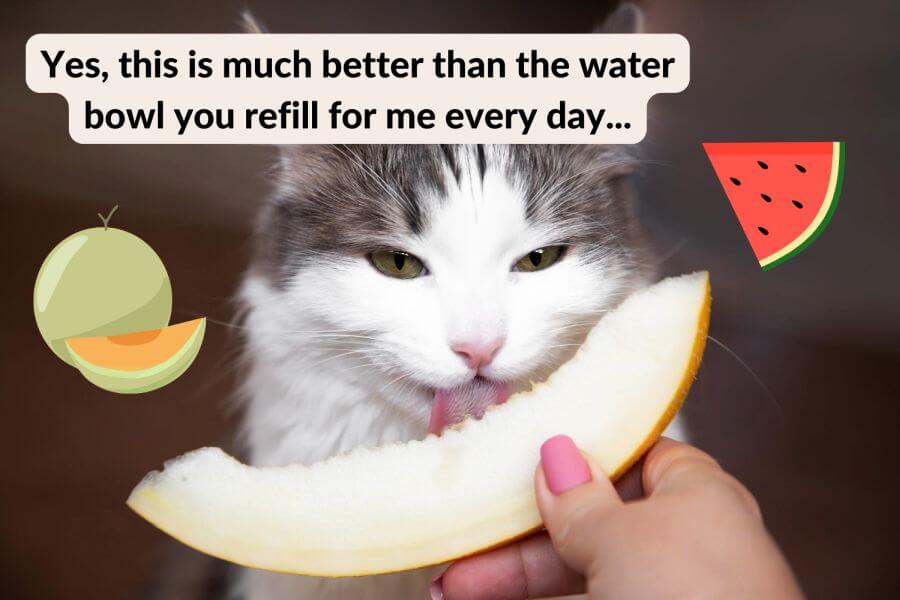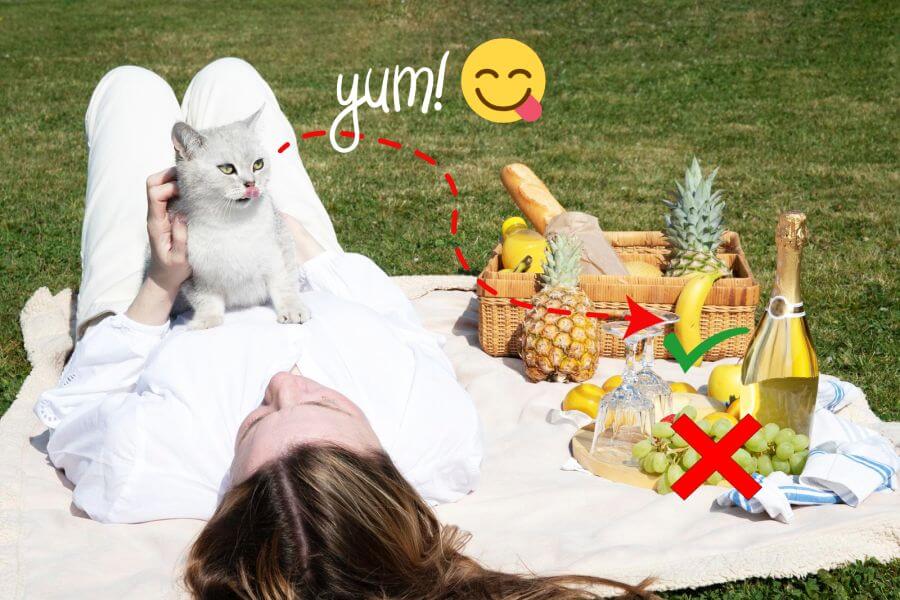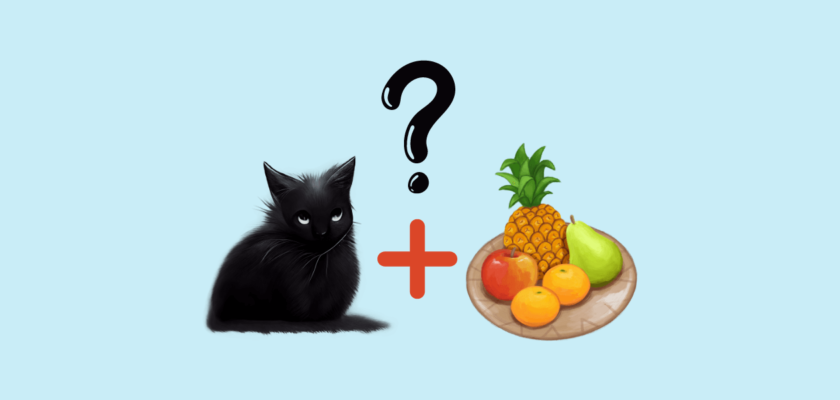Key Takeaways
- In general, cats don’t need to eat fruit or veggies but can do so occasionally ✔️
- There are a few fruits that cats can eat in moderation ✔️
- Avoid grapes, raisins, and citruses at all costs. Pomegranates and avocados aren’t the best choices for felines either ❌
- When feeding your cat fruit, stick to small portions. Too much can lead to weight gain or other health issues ⚠️
Can Cats Eat Fruit at All?
Cats are carnivores, so their digestive systems aren’t designed to digest fruits and vegetables. They should stick to a diet of cat food, meat, fish and other animal proteins. But can cats eat fruit as a snack? The answer is not that simple. While some fruits may not cause any harm to cats, others can be dangerous.

There are a few fruits that are relatively good for cats to eat. These include watermelon, cantaloupe and honeydew. These fruits are full of water and low in sugar. Other safe fruits for cats include berries. Read on for more details.
Fruits Safe for Cats: Blueberries, Watermelon and More
Can cats eat fruit without limits? No, but if you’re smart about it, you can safely include them in your pet’s diet. There are a number of fruits that cats can eat in moderation. Here are their benefits.
Blueberries
- Rich in antioxidants that can protect your cat’s cells from damage.
- May help improve cognitive function and memory.
Raspberries
- Contain ellagic acid, which can help protect your cat’s cells from cancer-causing free radicals.
- High in fiber, which can help keep your cat’s digestive system healthy.
Strawberries
- Loaded with vitamin C, which can help boost your cat’s immune system.
- A good source of manganese, an essential mineral for cats.
Kiwis
- Contain high levels of vitamin C and potassium, both of which can be beneficial for cats.
- A good source of fiber.
Bananas
- A good source of dietary potassium, vitamin C, and manganese.
- May help regulate blood sugar levels in diabetics; perhaps in diabetic cats as well.
Papayas
- High in antioxidants, including carotenoids and vitamin C.
- May help improve your cat’s immune system function.
Cranberries
- Contain antibacterial properties that can help keep your cat’s urinary tract healthy.
- A good source of fiber, vitamins and minerals.
Melons
- Particularly high in water, which can help keep your cat hydrated.
- A good source of vitamins A and C as well as potassium.
So, can cats eat fruit? The answer is yes, but you should stick to giving them the fruits listed above. And as always, consult your veterinarian if you have any questions or concerns about your cat’s diet.
Editor’s Note 🪶
There’s a thin line between a treat and a meal, so make sure you don’t cross it. While fruit like berries and pieces of melon can make a fun and nutrition snack for your cat, they can never be a complete meal for them. Make sure your kitty is still eating their normal amount of cat food.
Human Food Bad for Cats: A List of Fruits to Avoid
Some fruits that should be avoided in cat’s diet include grapes, oranges, and avocados. Grapes and raisins can cause kidney failure in cats, in addition to digestive issues and diarrhea. Citrus fruits aren’t a good option for cats either. They contain high levels of citric acid, which can be toxic to cats and cause stomach upset or digestive problems.
There are other fruits that cats shouldn’t eat. These include avocados and figs, which have the potential to irritate your cat’s digestive system. Pomegranates can also be dangerous because the seeds can cause intestinal blockages.
Feeding Your Cat Fruits: What to Remember
In conclusion, can cats eat fruit? Yes, but with a few caveats. When giving your cat fruit, stick to a small portion. Too much fruit can lead to weight gain and other health issues. Always consult with your veterinarian to find out how to introduce new food to your cat, including fruits or vegetables.
If you decide to serve your cat fruit, always remember to wash it thoroughly to remove any pesticides or chemicals. Also, cut it into small pieces – cats could choke on large ones. Remember that your cat’s diet should be based on meat, not fruit and vegetables. Fruit can be a tasty addition, but shouldn’t make up any more than 10% of their caloric intake.

Avoid giving your cat processed fruit snacks or treats, as these are usually high in sugar and unhealthy for pets. With a bit of research, you can safely include fruit in your cat’s diet and help keep them healthy and happy!
Frequently Asked Questions
What Is the Healthiest Fruit for Cats?
The healthiest fruit for cats is a debatable topic; however, some fruits may be more beneficial than others. Apples, berries, and mangoes are considered to be the most nutritious options. Many pet owners also give their cats small portions of other fruits such as melon, kiwi and papaya as occasional treats.
What Is Cats’ Favorite Fruit?
Favorites can vary from cat to cat. Some of the most commonly liked fruits include watermelon, cantaloupe, honeydew melon, strawberries, and mango.
What Fruit Is a Cat Scared Of?
It is unclear what fruit a cat would be scared of. It would depend on the individual cat’s experiences and reactions. Some cats may seem scared of citrus fruits, which are known to repel felines. Others may run away from the strong scent of durian. There is also one vegetable that many cats are scared of – the cucumber.
Is It OK for Cats to Eat Fruit?
Yes, it is generally okay for cats to eat fruits. Most cats enjoy the taste, and they can provide vitamins and other nutrients to their diet. However, there are some fruits that are toxic to cats, such as grapes and raisins. It’s best to stick with small amounts of safe fruits like apples, melons, and bananas.
Similar Posts:
- What Fruits Can Cats Eat? These Human Foods Are Safe for Cats
- Can Cats Eat Strawberries? Why Do Cats Like Strawberries?
- What Fruits Can Dogs Eat? 10 Safe Fruits For Dogs
- Can Cats Eat Grapes and Raisins? Are They Poisonous?
- Can Cats Eat Watermelon? How Beneficial Is It?
- Can Dogs Eat Raisins? Do Raisins Cause Poisoning?
- Can Dogs Eat Raspberries? Health Benefits of This Sweet Treat
- Can Dogs Eat Dragon Fruit?

